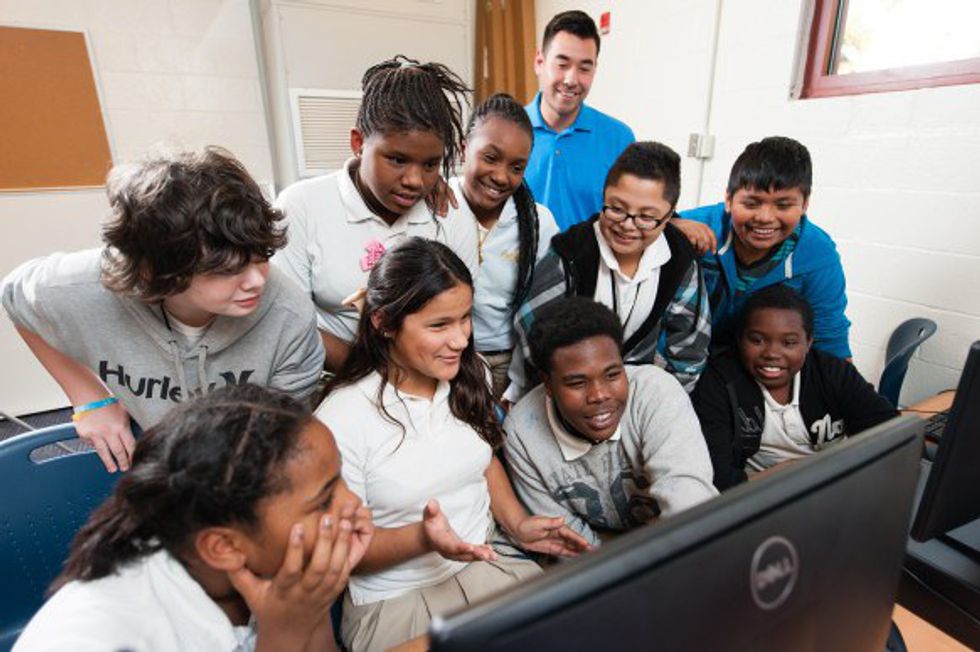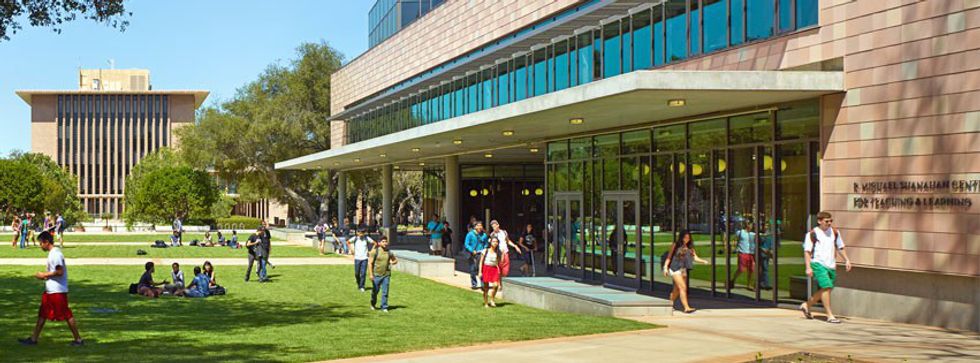I was hesitant to write this article at first, not knowing how people would take it. But when I shared it with my predominately humanities-loving fellow Scripps Odyssey writers, I was surprised at how many people readily agreed with me, without me even needing to argue my case. It seems that already a number of liberal arts students in the humanities are interested in computer science, crushing one of the main arguments against this.
To begin with, I highly recommend this video featuring Harvey Mudd College's President Maria Klawe and Code.Org's founder Hadi Partovi for "Why Computer Science" in general and related topics:
Jump to 32:20 to see Maria Klawe directly answer a question about computer science in liberal arts colleges and how popular it has been at the Claremont Colleges (or rather, all liberal arts colleges).
I can't say "why computer science" better than they can. They are some of the leading experts in this field and some of my personal heroes. But what I can do is offer a current liberal arts college student's perspective.
To begin, let's address the reason why not. Computer coding is considered a skill, not a study. Liberal arts colleges focus on broad knowledge and increasing intellectual capacity rather than focusing in on one particular brand of skills like coding. However, when taking a look at the big picture of computer science, it's potential and necessity in liberal arts curriculum (as well as college curriculum in general) becomes clearer.
Some students don't test well in mathematics.
I'm a firm believer that there is no such thing as being bad at math, but there certainly is a such thing as being bad at testing in math. But what if instead of drudging through complicated geometric proofs, one could show off their geometry prowess with creating an Angry Birds-type of game? Even though I've chosen a math-related field for my career, I would still choose making a game over a geometric proof every single time.
And how about calculus?
If you find this confusing, you're not alone. And after tutoring calculus for two years, I would say this is perhaps one of the more understandable textbook type of explanations of what an integral actually is. Yikes.
If you have a teacher who can really teach the concept behind it (rather than just how to find the numerical/formulaic answer), then you're extremely lucky. Most of my tutees, while they are perfectly capable of finding the integral, are vague when I asked them if they understand what an integral actually is. What I found helped me understand integrals conceptually best was when I had to write code that worked like integration. To do it, we were forced to really break down integration into tiny parts (pun intended), which explained it better than any graph, problem set, or math test I ever took. So not only can computer science implement mathematical concepts, it can actually be a tool for making sure students truly understand whats going on.
It's a lens.
I'm stealing this one from Maria Klawe. Liberal arts colleges emphasize using various lenses - feminist, historical, Foucault, etc. -- to view the world. Each of these lenses reveals something new about the world. With computer science being essential to the current world, chances are no matter what field you go into, computer science will have touched it in one way or another.
More women and people of color are needed in computer science.
Liberal arts colleges often have a high number of women, people of color and others who come from disadvantaged backgrounds. As computer science seems daunting, most people won't bother taking it, particularly those from backgrounds that are underrepresented in the field. Women make up less than a quarter of all computer science majors, and minority women are less than 1 in every 10 employed scientists and engineers. So the idea of going into such a course -- particularly when the courses themselves may be male-heavy and rather white dominated -- can be incredibly overwhelming. A required course, however, would make the class automatically match the diversity of the school itself, making the race and gender make-up no more discouraging than any other required course.
But why is this important? Well, one, we shouldn't even have to answer this question any more than we should have to answer "What unique perspective does a minority student bring to a physics class?" Ugh. Ugh. Ugh. Ugh x 100. Ugh^1000. No one asked what unique perspective a non-minority student brings to physics, computer science, or any field. But if you seriously do need convincing that our classrooms and workforce should be at least as diverse as our country, the article linked above gives great arguments for physics, and here's a computer science specific argument:
Technology is prejudiced.
OK, perhaps not technology, but rather, those coding it. Maybe not even intentionally. In fact, most of the time, I can give them the benefit of the doubt. Most likely, it meant they had a homogeneous work environment that didn't require them to remember that not all users are just like them. Take facial recognition technology, for example. It works surprisingly well for white faces. Faces of color? Not so much. Slack engineer Erica Baker says this is because "the people who are building these products are white people, and they’re testing it on themselves. They don’t think about it." Or take Dr. Louise Selby who was automatically registered as male at her gym since the technology assumed anyone with the title "Dr." must be male. Women and people of color would be more aware that they do, in fact, exist, and make technology accessible to all. And algorithms can be extremely prejudiced. They often rely on stereotypes to assume what your interests would be. For example, editors on the Mary Sue found that because of their technology related interests, Google's algorithm inferred they were male and sent them male-aimed advertising. And these are not isolated incidences. While supposedly white men should be able to take such things into consideration, it's clear that is not what is currently happening. We need people with diverse backgrounds in technology so that technology can adequately serve the needs of this diverse world.
Accessibility is so important.
Professors would be more encouraged to make their introductory course generally accessible if it is a required course. I absolutely understand why most liberal arts students avoid taking computer science as an elective. It's terrifying. I was actually originally going into humanities, but was lucky enough that the STEM courses at my college were very accessible and made me realize what I really love. After AP Computer Science though, I was still incredibly hesitant about taking more CS, but had to for my major. Since Harvey Mudd (one of my partner campuses) revamped it's CS5 curriculum specifically to be more accessible to a larger audience, it turned out to be a great experience, and I've now taken CS electives for fun. And my CS partner? She was an English major. And I could go on with the diverse list of people who found they could take that course. But this only happened because Mudd made a specific attempt at making their course be more accessible so that people of diverse backgrounds would feel comfortable in it.
Making ethical choices in the modern world.
I think we can all agree that the modern world runs on technology. And it's near impossible to avoid it. But how do we make ethical choices with our technology? Humanities -- such as philosophy, psychology, gender and women's studies, race and ethnics studies -- hold the key. But how can they truly get at the heart of the problem without experiencing computer science firsthand?
Furthermore, how can writing majors write knowledgeably if their "well-rounded" curriculum covered everything but computer science? Even worse, how can politicians make educated decisions about computer science education, how to deal with cybercrime, and the many other relevant issues, if they never even attempted the slightest bit of computer science? Granted, one course wouldn't solve this. But making it a more standard part of the well-rounded liberal arts curriculum will bring this issues to light.
But what are these issues? I couldn't possibly list all of them. You already got a taste of some of the issues in why we need more people of minority backgrounds. And so many people have had identity theft, an account hacked, information stolen, credit card numbers hijacked, and other such issues from people using CS unethically. Self-driving cars are grappling with ethics issues like if the only options are letting the driver die or letting a pedestrian die, whose life should the car prioritize? And as AI develops, where are the limits drawn? Can and should we let computer interaction replace human interaction, as in the movie "Her?" There are already a million questions, and there will only be more. While computer scientists generally have the humanities background to make an informed decision, experts of all fields need to be able to discuss this intersection of CS and their field intelligently and make ethical choices.
The main difficulty is simply the resources for such a class. There simply aren't enough professors, and more to the point, the type of CS professor you would want teaching a required CS course to those who may already be anxious about taking such a course is rare. So I definitely don't propose every liberal arts college go out right now and start such a program. But as more people get a chance to attempt CS, more people might decide on that path and thus there will be more professors. In particular, liberal arts professors who also had a varied enough background that they learned how to incorporate intersectionality and be accessible to all students, thus beginning a cycle in which more consistently more diverse people attempt computer science. And maybe, just maybe, one day there will be enough excellent CS professors (like the amazing profs at Harvey Mudd!) that liberal arts colleges (other than Mudd which already requires it) can actually require computer science and reap all of these benefits, creating even more intellectual, well-rounded students than ever before.
While the point of this article is to argue for a well-rounded, liberal arts version of a computer science curriculum, if this inspired you to take a dip into the coding world, here are some resources to check out, including a reference to a data science ethics course, something liberal arts colleges ought to be offering more commonly.









 women in street dancing
Photo by
women in street dancing
Photo by  man and woman standing in front of louver door
Photo by
man and woman standing in front of louver door
Photo by  man in black t-shirt holding coca cola bottle
Photo by
man in black t-shirt holding coca cola bottle
Photo by  red and white coca cola signage
Photo by
red and white coca cola signage
Photo by  man holding luggage photo
Photo by
man holding luggage photo
Photo by  topless boy in blue denim jeans riding red bicycle during daytime
Photo by
topless boy in blue denim jeans riding red bicycle during daytime
Photo by  trust spelled with wooden letter blocks on a table
Photo by
trust spelled with wooden letter blocks on a table
Photo by  Everyone is Welcome signage
Photo by
Everyone is Welcome signage
Photo by  man with cap and background with red and pink wall l
Photo by
man with cap and background with red and pink wall l
Photo by  difficult roads lead to beautiful destinations desk decor
Photo by
difficult roads lead to beautiful destinations desk decor
Photo by  photography of woman pointing her finger near an man
Photo by
photography of woman pointing her finger near an man
Photo by  closeup photography of woman smiling
Photo by
closeup photography of woman smiling
Photo by  a man doing a trick on a skateboard
Photo by
a man doing a trick on a skateboard
Photo by  two men
two men  running man on bridge
Photo by
running man on bridge
Photo by  orange white and black bag
Photo by
orange white and black bag
Photo by  girl sitting on gray rocks
Photo by
girl sitting on gray rocks
Photo by  assorted-color painted wall with painting materials
Photo by
assorted-color painted wall with painting materials
Photo by  three women sitting on brown wooden bench
Photo by
three women sitting on brown wooden bench
Photo by 
 Photo by
Photo by  Photo by
Photo by  Photo by
Photo by  Photo by
Photo by 


 people sitting on chair in front of computer
people sitting on chair in front of computer



 all stars lol GIF by Lifetime
all stars lol GIF by Lifetime two women talking while looking at laptop computerPhoto by
two women talking while looking at laptop computerPhoto by  shallow focus photography of two boys doing wacky facesPhoto by
shallow focus photography of two boys doing wacky facesPhoto by  happy birthday balloons with happy birthday textPhoto by
happy birthday balloons with happy birthday textPhoto by  itty-bitty living space." | The Genie shows Aladdin how… | Flickr
itty-bitty living space." | The Genie shows Aladdin how… | Flickr shallow focus photography of dog and catPhoto by
shallow focus photography of dog and catPhoto by  yellow Volkswagen van on roadPhoto by
yellow Volkswagen van on roadPhoto by  orange i have a crush on you neon light signagePhoto by
orange i have a crush on you neon light signagePhoto by  5 Tattoos Artist That Will Make You Want A Tattoo
5 Tattoos Artist That Will Make You Want A Tattoo woman biting pencil while sitting on chair in front of computer during daytimePhoto by
woman biting pencil while sitting on chair in front of computer during daytimePhoto by  a scrabbled wooden block spelling the word prizePhoto by
a scrabbled wooden block spelling the word prizePhoto by 
 StableDiffusion
StableDiffusion
 StableDiffusion
StableDiffusion
 StableDiffusion
StableDiffusion









